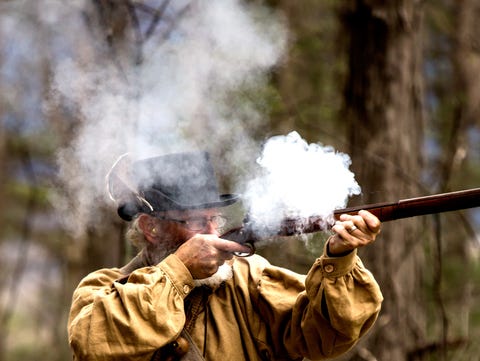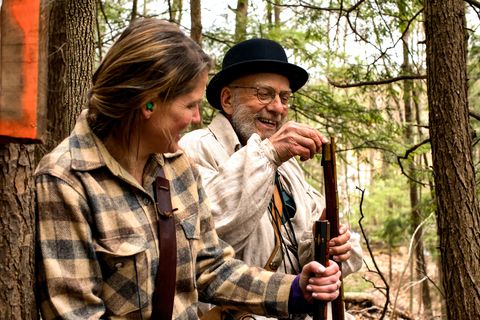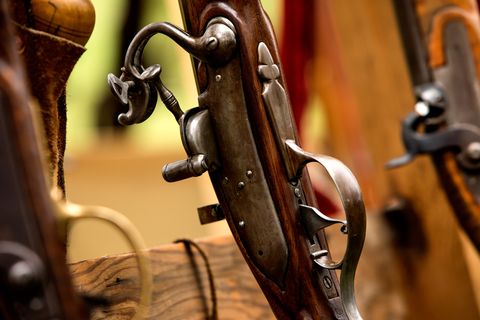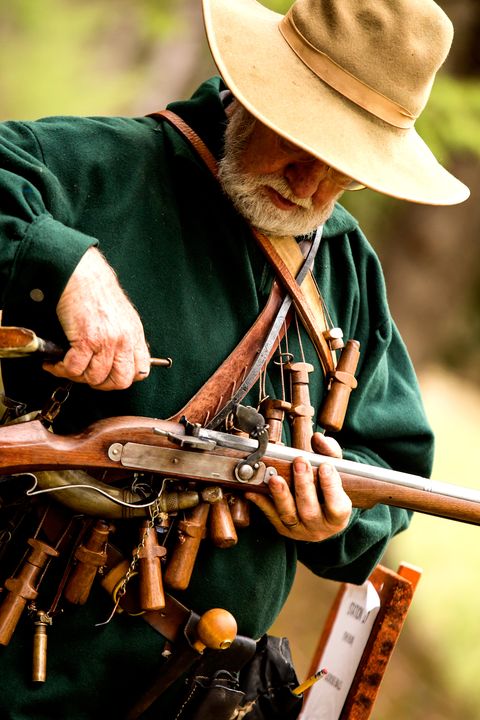
These men, Gary Perkins and Eric Bye, both local guys, work through the measured preparation of their guns, finishing with the definitive rap of the ramrod. They look at each other, then to the axe blade. Perkins packs away his normal cheer someplace deep within him and shrinks his world to that sharp metal edge. He steps past Bye, raises the rifle to his cheek, stoic, eyes clear as they look down the iron sights of the gun, lining up the small bead between the arms of the V inches from his nose. The crowd’s silence peaks, momentarily exciting the gravel. The entirety of this competition—the year’s bragging rights—depends on the bullet he packed spinning down the rifling of the barrel, flying true, and splitting in half on the edge of the blade.
This is Paul Bunyan stuff. Billy the Kid, man. It seems fine in those tall tales, but now? This can’t be 2017, right? A bunch of teachers and electricians and laborers out here in the yard on a Saturday afternoon? With pizza later? And yet, something about those tales comes through, the exceptional skill, the dogged hard work, the pride. Insurmountable challenges and those bold enough to face them, confident enough to conquer them. They’re stories of our national identity, stories we aspire to. So when you happen to own a rifle and your friend sets up an impossible course every year and invites you to come try your hand . . . well, you come. Perkins shoots. Muffled thunder of burning gunpowder, the boom of a rocketing bullet, the cloud of smoke obscuring the gun, its tip as steady as if it rested upon a fence post.
The crowd stares into the smoke, waiting for it to blow away, looking for the orange clays.
One year before. On the outskirts of Middlebury, Vermont, I knocked on the door of Harley Grice’s white farmhouse, hands buried in my pockets, half hoping he wouldn’t answer. When a friend of mine, the college librarian, told me she was shooting black-powder rifles, I asked her to teach me. She said something about not being able to get out of work, and she gave me Harley’s address.
He was expecting me. I stood there in his kitchen, cabinets painted with apple trees growing hearts, intimidated by the white-bearded, enormous-boot-wearing octogenarian who skipped small talk. But a few minutes in, his smile rearranged the wrinkles beneath his thick glasses, and a chuckle puffed out of his chest. Then he put a gun in my hands. Harley’s the type of man you could imagine breaking the West, or gracing the back of a quarter, his life the pride of an entire state. He worked the dairy farm he grew up on for more than five decades. When he feels restless, he drives his camper out to the Rockies. On any given morning he’ll wake up, read his Bible, and split enough wood for the week before I’ve pulled the blanket over my eyes. He keeps a room decorated in honor of his late wife, Marilyn, keeps his daughters close, and befriends most all he meets, even clueless kids from the local college.
Every year for the past five years, Harley picks a day and invites all his friends, some he went to Middlebury Union High School with in the early ’50s, some he met the week before, to his house for a black-powder rifle shoot: eighteen stations, eighteen handmade targets, spread over the 300 acres of his farm. Every man, and a handful of women, shooting for themselves, recording hits and misses—X’s and O’s—on crumpled paper with an inevitably dull pencil. Some years he makes age brackets, or men’s and women’s. But the 2017 shoot would be different: Only the top six shooters of the day would be recognized. After eight months without practice, I was pretty sure I wouldn’t be one of them.
Harley had spent weeks welding and experimenting with new targets, covering them all with neon orange spray paint that lingered in patches across his lawn. He prepared guns for those who couldn’t bring them, passing hours in his basement beside his overflowing gun rack, naked lightbulb shining down on his thick fingers running cleaning patches through already pristine barrels, counting out bullets, filling a fleet of powder horns. He cleaned the bedrooms on the second floor of his house for those, like me, who would be coming from afar: Boston, Canada, the edges of the Vermont border. A stack of sheets, towels, and a fresh bar of soap greet every guest.
I had graduated college by this point, and would be traveling back to Vermont for the shoot. On the last mile of my three-hundred-mile trip, I practiced the slow finger pull of a trigger above my steering wheel. Imagining shots near his swamp, or over the corner of his pond, hoping to avoid flinching or some other embarrassment. The windows of the house Harley built with Marilyn from plans in a magazine cast shadows of light across the graded dirt of Halpin Road.
At the dining room table with his daughter, son-in-law, and two-year-old grandson, Harley turned toward the opening door. Behind him, dozens of eyes looked out from the living room, the largest from an elk with a six-foot-wide rack. With a grin, he got up from the kitchen table and moved toward the door with the eighty-one-year-old shuffle-jog-step he does when he moves quickly. Massive hands and broad shoulders wrapped me in a tight bear hug.
“James is here!”
Rifles crow the dawn, a few early guests getting ready for the day. By mid-morning, they gather across the street at Harley’s daughter Penny Curler’s house and rest their guns on the beds of trucks, handmade wooden racks, and boot toes to shake hands, slap-hug, meet new folks, and catch up.
Ernie Malzac, a friend of Harley’s from elementary school, drove from a few doors down in his CR-V. It’s the same truck he and Harley used to pull a deer out of the woods last winter. A friend from the street over arrives with a muzzleloading pistol wedged between his chest and the immobile sleeve of a sling from a recent roofing mishap. Eric Piccioni gets out of his camper and introduces himself to the others with an earnest grin and plumb-line nose, his wife beside him. They met Harley a few months before at a shoot close to the Canadian border, and came all the way from Lacrombe, Quebec, just for the invitational. Joe Church, white beard beneath his top hat with two halves of a playing card he shot tucked into its band, drove in fifty miles this morning. Gary Perkins, eyes disappearing into smile lines behind small glasses, emerges from his FJ Cruiser. It’s only a moment before someone asks him about the goats he’s raising. In three years they’ll be trained to carry deer out of the woods on hunting trips. But when they were infants he had to wake up every three hours to feed them, says it was worse than raising a kid.
About half the crowd dresses as if they bought their pants with their muzzleloaders. Bowler hats, blanket coats, various articles of handmade clothing and repurposed material. “You don’t go out and buy, you make do until you can make better,” one of them tells me, recounting the recycled purse he once carried bullets in. These are the descendants of Ethan Allen and the Green Mountain Boys, living an older, non-disposable way of life.
John Curler, one of Harley’s sons-in-law, fires a small cannon to grab the crowd’s attention. Harley steps up front, says hello to his friends, and offers a prayer: “Lord thank you so much for this day. For the sunshine that is about to appear. We ask you, Father, for safety in the day and good fellowship. We ask it all in Jesus’s name, Amen.”
The collective exhales an “Amen,” gives final well wishes, and splits into groups of six to eight that head for stations throughout the woods. The goal is to hit the target at all eighteen. Throughout the morning, they’ll pat another group on the back for its successes, maybe, and they’ll give helpful tips when they can.
But here’s the thing: They’ve got scorecards in their pockets, and they remember who won last year, and the year before.
“Is that a propane tank?”
“It is. I sure hope it’s empty.” The targets are cobbled together from bits and pieces scavenged from the farm. An old spring, an ancient plow, thin strips of steel, bowling pins, golf balls, metal daisies, swinging chains, a bent pipe that bounces bullets around a corner, and, in this case, a swinging propane tank.
Overtly aware of our mortality, and hoping the invitational doesn’t turn into a memorial, we begin to load our guns.
Rather than simply inserting a bullet into the breach, muzzleloading is a multistep process. Its success, and your safety, depends on an exact order that Harley hammers into the head of new shooters with the mantra: “Powder, Patch, Ball.” It isn’t easy. You wear the tools around your neck. First down the barrel, fifty grains, about a spoonful, of black powder poured from a hollowed-out cow’s horn. Then a greased cotton patch with a bullet, slightly smaller than a marble, pushing into it. A wooden-ball starter, a palm-size sphere with a dowel sticking out, pushes them a few inches down the barrel, a ramrod finishes the job. Each shooter’s motions are choreographed—two taps here, an extra push there. Consistency is accuracy.
These steps, the necessity for precision, are what draw many of them. They grew up shooting and hunting with modern rifles, but muzzleloaders are different. It’s like driving stick, or listening to vinyl. When you have to work with the tool, be involved with every step of its success, you feel a deeper connection. Each shot, absent modern aids or scopes, must be perfect. There is no second chance at a fleeing buck. They all have stories, and trophies, of the single bullet that took down the deer, elk, or bear.
I step up to my eighth station of the day, boot touching an orange stake, the official shooting line. I raise the gun to my shoulder. The long octagonal barrel dances about, my left arm struggling to calm it. My sheet has more X’s than I expected by this point, and I can feel the jury of real Vermonters, real men, behind me, looking out to the target for even a glancing hit. Mind on my scorecard, I pull the trigger slowly, the hammer snaps, the explosion obscuring sight and sound, a swift shove into my shoulder.
Miss.
“Low and to the left,” the men behind me say as I draw the gun off my shoulder. A guy named Tom McElhaney walks over, asking about the carved deer antler I used to measure out powder. I hand it to him. “I’m borrowing it from Harley,” I say. He takes it in his hands, turns it over, and nods faintly.
“I think I made it for him . . . ten years ago? Yep, right there, that’s where I repaired it when a piece of the carving fell off.” He hands it to me and wanders back to another conversation. People talk about gear, new guns, leather bags, handmade tools. I ask Joe Church, playing card still perched in his hat, about his gun.
“I make all my guns. This one is the first I ever made. I make maybe two or three a year.”
Ralph, next to him: “I made my gun, too, close to forty years ago.”
Brian, a feather sticking out of his floppy leather hat: “Me too, I’ve built nine.”
I felt shabby in my synthetic jacket, my clothes conspicuously clean and untorn, tags attached, phone bulging from my chinos. More than any desire to hit a target, I want to live up to these men and women covered in things that hadn’t existed until they realized they needed them. To build, to make, to not rely on the store’s medium rack. At least to have the confidence to try.
Another member of the group shoots at the propane tank. Dead center, it bangs from tree to tree, an enormous dent in its front.
“I guess it’s empty.”
The next group put a hole in its side, and the tank spun about like a deflating balloon, propane hissing from its side.
Some years, the winner misses only one target. Perfection seems attainable. At that level, the challenge isn’t hitting targets, but rather not missing them. After each shot, it’s either the ring of flattening lead or a muffled curse. As groups pass the same call goes out, “How you guys doing, anyone perfect?” No one checks their cards, they already know. “No. No. Nope.”
Anyone could take the lead. As the number of stations dwindles, some participants stop and reach into leather satchels for cleaning patches and solvents to clear the residue of burnt powder from their barrel. They do this half to avoid any malfunction in these crucial last stations, and half to calm the mind. The day’s chatter quiets. Everyone wants to finish strong. The last thing you want in your head as you look down the barrel at a target is the image of dirt jumping up beside the last one you missed.
Three left, two left. Passing groups silently nod, not wanting to jinx their friends, not wanting to jinx themselves.
One station left.
If it weren’t for the racks of guns and strong smell of gunpowder, it could be a church picnic. Slices of pizza, from the one parlor in town, float through the air on paper plates clutched in storytelling hands. People talk. Many lean over Perkins’s shoulder, bedamning their missing readers, squinting down the length of his arm at photos of goats.
John moseys to the front of the crowd again, cannonless, and, yelling a few times, gets their attention. Next to him sits a stack of trophies, wooden discs Harley cut from a decades-old fence post, hand-painted with the optimistic script of a 1950s advertisement. The participants get their first looks, and a few remark how handsome they are. Each of us silently decides what will have to come off the mantel, replaced by this new prize. Looking at the stacks of crumpled paper in his hands, sloppy X’s and O’s, John begins to read off the winners. A mix of camaraderie and competition, the men and women cheer for their friends, but wait for their own names. The successful make their way to the front trying to hide sheepish grins, beards more effective than force of will. The stack shrinks, brows furrow, the crowd laments missed targets and remarks on the trophy bearer’s great shots. John pauses, two discs remaining, and looks at the papers again. With only two misses each, Gary Perkins and Eric Bye tied for first.
There will have to be a shoot-off. The axe.
Their friends push the men to the front. They wipe pizza grease off their fingers, soaked up by napkins, flannel shirts, and the legs of Carhartts, and pick up their guns. They stand next to each other, the careful measurement of powder interrupted as they laugh at shouted jokes and encouragements.
Perkins steps up, Bye leans on his rifle. Perkins raises the barrel, looking down the sights beneath the brim of an olive-green baseball cap. Steady. He pulls the trigger.
The ringing clang of metal hitting metal, shearing metal. The clays on either side shatter, and the silence of the crowd. Small pieces of orange skitter down the face of the stump. Perkins lowers his gun, and calmly steps to the side. Bye smiles at him, and steps to the line. A miss means he loses, a hit means they’ll both have to shoot again.
He raises his gun, quiets himself.
Perkins reloads, ready for Bye to make the shot.
Clang. The skitter of two broken clays.
The afternoon has turned into an exhibition. The cheering crowd forgets their missed shots, hang fires, faulty flints, itchy socks, and focuses on this bit of extraordinary in the afternoon. Perkins steps up to the line again.
Clang.
Two broken clays, wide eyes, open mouths. Perkins can’t help but smile. He steps to the side. His goats grow forty feet tall.
Bye cheers with the rest of the crowd, then steps back up to the line and raises his gun. Steady, eyes focused—he pulls the rifle off his shoulder, makes an adjustment, slowly brings it up again.
Ping.
Orange rushes off one side of the stump. Its opposite sits unbroken. The bullet deflected off one side of the axe.
The crowd surrounds the two men. They are already recounting the incredible shots, a story they won’t tire in retelling. Bye walks over to Perkins, smiling, congratulating him. John walks over to both and hands them their trophies. Arms around each other, they smile genuine smiles into a camera.
The crowd buzzes as it spreads back across the yard. There is more shooting, and more eating, and more camaraderie, but soon the crowd will disperse, back to their trucks to clean guns and head home. Before they do, they’ll make their way over to Harley, the patriarch, and thank him. He’ll hug them, step back, and shake their hand, looking into their eyes with an iridescent shine in his own. Not letting go of the grip, he’ll carefully choose each word, passing them through a constant smile, and make plans to see them again, next week, in a few months, next year. To shoot, to say hello.
The prayer for fellowship is answered. Even if the sun never did break through the clouds.
Only a few pizza munchers remain in the yard. Perkins puts down his award, picks up his gun. There’s a third bullet already loaded—preparation in case Bye had forced another round. Standing alone now, absent the forward-leaning crowd, Perkins raises the muzzle of his gun, and aims it squarely, slowly, at the axe blade. He steadies himself, his body motionless for a quiet second.
He pulls the trigger.
Clang.


